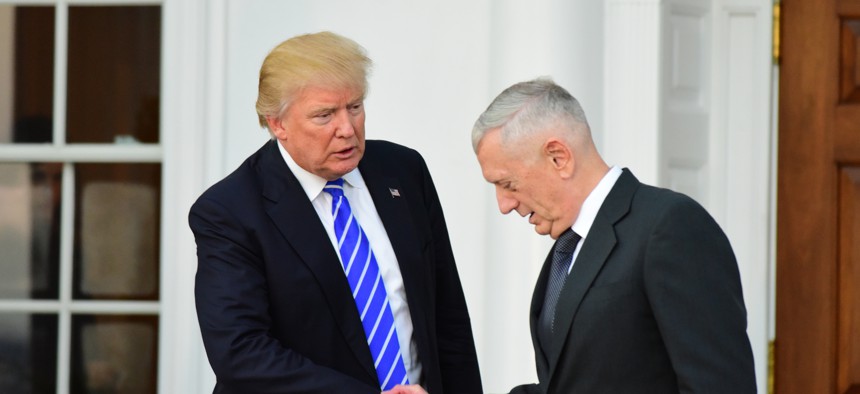The immigration order is only the latest matter to cause friction between Trump and the ex-brass, much of it following the same template—frustration over lack of communication and a sense that the White House demands its way over the objections of department staffers.
The Journal also reports that Kelly was upset at the White House for pushing Kris Kobach for the role of his deputy. Kobach, who is the Kansas secretary of state, is an outspoken immigration hawk and proponent of strict voter laws as a response to discredited allegations of massive voter fraud. Kobach was reportedly the West Wing’s choice to be Kelly’s deputy, but Kelly refused, desiring a candidate with more homeland-security experience. Elaine Duke, a longtime DHS administrator, is reportedly in line for the job.
Mattis has also reportedly clashed with the White House over appointments. The Trump team nominated businessman Vincent Viola to be secretary of the Army without first consulting the defense secretary-designate, who had not yet been confirmed at the time. CNN and The Washington Post both reported on conflicts, though the Trump transition denied any friction. While Trump has repeatedly suggested he would bring back the use of torture, Mattis has insisted that such tactics are immoral and counterproductive.
Other reports suggest that Trump is also displeased with Flynn, though for different reasons. Flynn is by most accounts a brilliant intelligence officer with some managerial weaknesses, and he was a leading Trump supporter during the campaign. The Times reports:
But Mr. Flynn, a lifelong Democrat sacked as head of the Pentagon’s intelligence arm after clashing with Obama administration officials in 2014, has gotten on the nerves of Mr. Trump and other administration officials because of his sometimes overbearing demeanor, and has further diminished his internal standing by presiding over a chaotic and opaque N.S.C. transition process that prioritized the hiring of military officials over civilian experts recommended to him by his own team.
Flynn was reported to be a player in the split between Mattis and the White House.
When Mattis and Kelly were nominated to head departments—Flynn, as national security adviser, did not require Senate confirmation—some progressives worried that the generals would either be too willing to acquiesce to Trump’s wishes, unlike career civilian officials, or that the heavy presence of brass would undermine the cherished civilian control that is a hallmark of the United States government. Mattis required a waiver to run the Pentagon because he had not been out of uniform for the decade typically required before a former officer can serve in a top civilian role, and Senator Kirsten Gillibrand, a New York Democrat, refused to vote for the waiver.
But there’s another possibility, which is that the generals could serve to constrain Trump. Unlike the president, who has suggested a lack of specific knowledge about the Constitution in the past, military officers are well-versed in the law and their own obligations—a knowledge that manifested itself in Mattis’s comments arguing against torture. They also care deeply about following rules and procedures, and for instilling a sense of order. The last week has shown that Trump’s advisers, by contrast, and in particular Stephen Bannon, are perfectly content with chaos, and perhaps even welcome it.
It’s certainly not unheard of for generals, usually active-duty ones, to play the role of a check on elected leaders, in various forms. In Turkey, the military has tended to view itself as the guardian of secular norms, and has repeatedly stepped in to topple civilian governments that generals feel have strayed from national principles. Israeli Prime Minister Benjamin Netanyahu has repeatedly clashed with the nation’s military leaders, who reportedly stayed him from launching an assault against Iran’s nuclear program. In May 2016, Netanyahu scolded Major General Yair Golan for comments critical about Israeli policy.
Some commentators have raised the idea that serving military officers would refuse to execute orders from Trump if they believed they were unconstitutional or violated international treaties. But the idea of military officials acting as a check on elected officials is disconcerting. Even if one thinks Trump is acting lawlessly, a de facto coup is also lawless. There’s no good option.
Mattis and Kelly, however, are now civilian officials. So far, their objections have been private, though waged partly in public via press leaks. The test of whether they will prove to be an effective counterweight to Trump’s overreaches and disregard for protocol will come if he continues to push decisions down on them. Trump cleverly employed retired brass to grant himself credibility, which means that the generals now have some power to revoke that credibility. Would they willing to publicly break with the president? If so, would Trump be willing to fire them?







